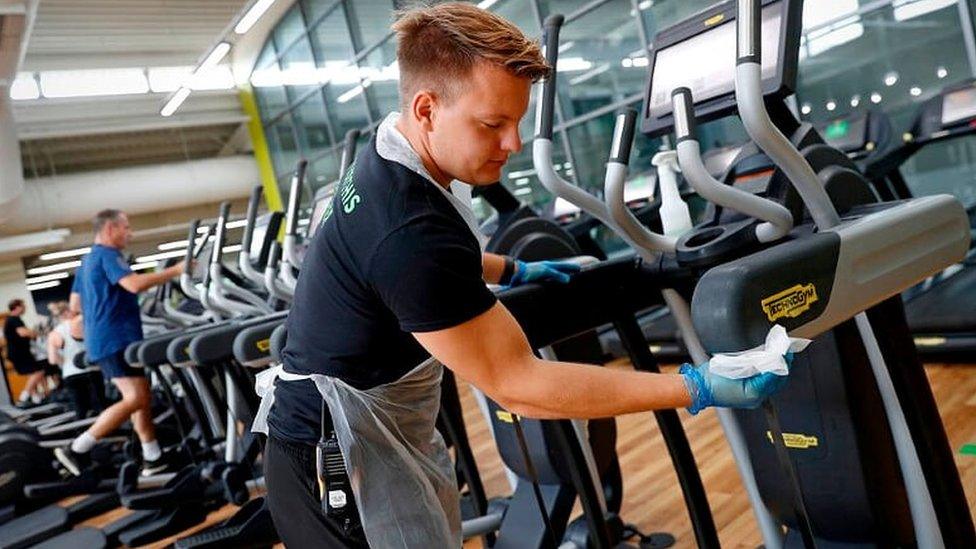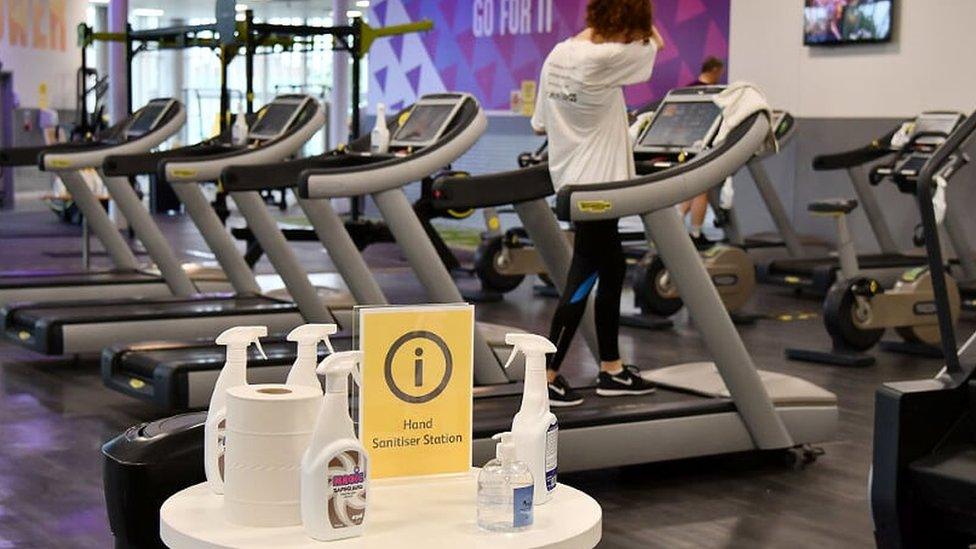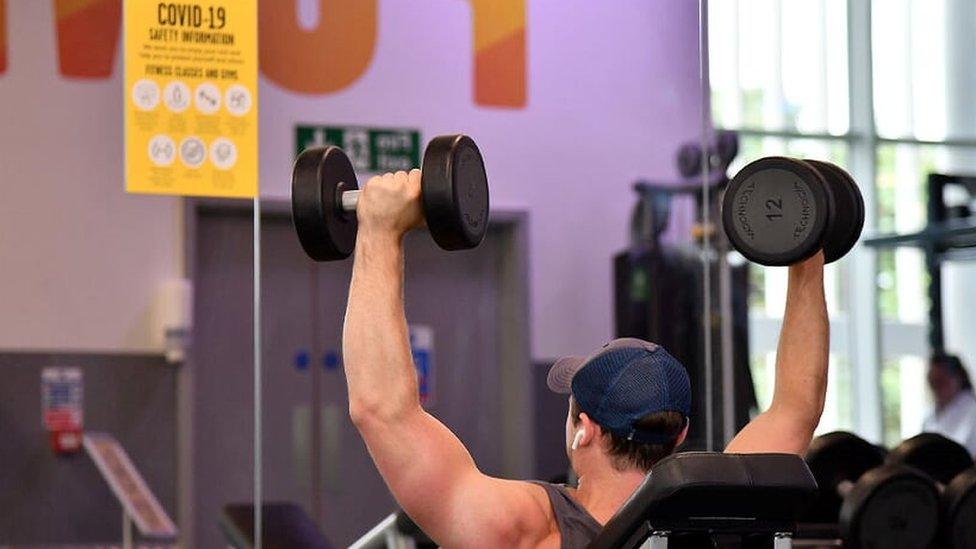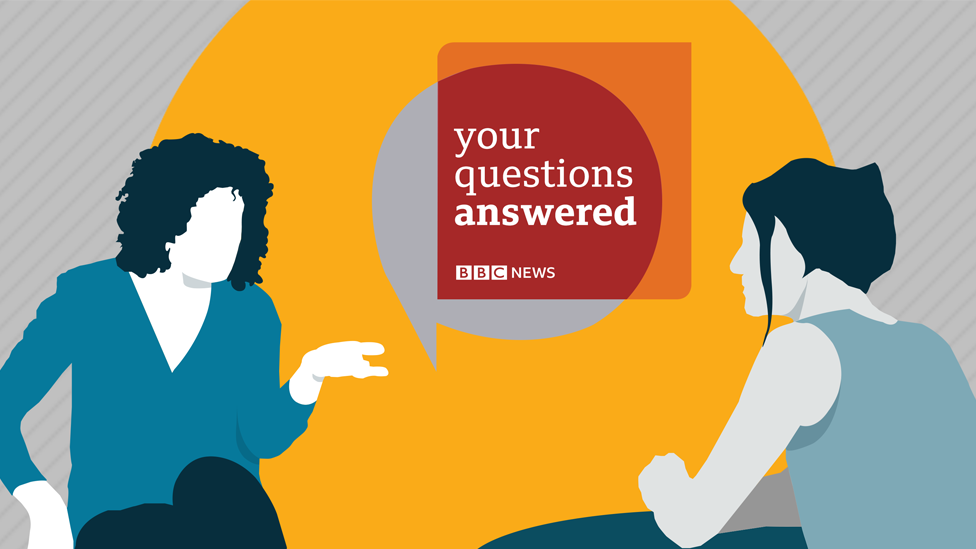Gyms and coronavirus: What are the facts?
- Published

For the second time this year, gyms in England are closing their doors.
Some areas such as Liverpool had already turned off their treadmills, but now the rest of the country is following suit.
It's after the government announced a second national lockdown, which means pubs, restaurants, non-essential shops and places of worship will also be closing on 5 November.
But what's the science behind shutting gyms?
Are they riskier than shopping or going to a restaurant? And what will it mean for the mental health of gym users?
What does the science tell us?
"It's very difficult to know for sure where people get their virus," according to Professor Jonathan Ball, who's a virologist at the University of Nottingham.
He says gyms are closing because the government is trying to react to the high number of coronavirus cases.
"When you've got such huge numbers of cases in the community, particularly in people who are young and healthy, they may not experience any symptoms at all.
"There's always a risk that you might interact with someone who's infected [without either of you knowing] and that allows the virus to transmit."
Gyms might not be as high risk as hospitals or care homes but Prof Ball tells Newsbeat: "You do tend to exercise quite vigorously, that means that you can breathe rapidly and quite deeply.
"Therefore, we'd expect that you could potentially produce droplets or aerosols that could go on to infect other people."
He also points out there are lots of areas of gyms that people touch, like handles and equipment, before touching their faces.

There is a big "but" though.
Prof Ball says a lot of that risk can be dramatically lowered through things like effective air-conditioning, regular cleaning, social distancing and hand sanitising.
"From the data that I've seen from Public Health England, I'm not aware that there is a significant hotspot for infections in the gym environment.
"We know where the major risks are but after that we know there are other activities where people mix and where people mix, there is a chance of transmission occurring."

Analysis by BBC Reality Check
The only government data on gyms comes from Public Health England's surveillance report, which is based on data from Test and Trace, external.
That data puts gyms on 2.8%, while supermarkets are 11.2%, pubs and bars are 7.4% and secondary schools are 6.8%.
What those percentages mean is a bit tricky - here's where they come from.
In the week to 25 October, 107,046 people who had tested positive for coronavirus were referred for contact tracing.
Of those, 33,233 had been somewhere in the previous seven days that at least one other person contacted had visited.
About 930 of those said they had been to the gym - that's 2.8% of all the common locations reported. We don't know if they caught it at the gym - we just know they visited the gym.
Is that a lot? It's hard to tell - you need to take into account how many people visit a gym regularly compared with, for example, a supermarket.
The point is that for the latest week, gyms came sixth on the list of common locations, ahead of people attending universities, people working in care homes and people going shopping for clothes.
And the government is bound to have noticed that.
Its scientific advisory group Sage estimated in September that closing indoor gyms and leisure centres could potentially reduce the R number (that's the average number of people each infected person infects) by 0.1, external, but stressed that estimating that was "very difficult".

What do gym users say?
Trainer Nathan Penman spoke to Newsbeat just before his gym closed in Liverpool in mid-October.
Gyms in the Liverpool City Region closed earlier than the rets of the country, when the region went into tier three - the highest Covid alert level.
"It's just a bizarre feeling in the gym. It's the same kind of consensus among everybody there."

Nathan at one of his final spin classes before gyms in Liverpool closed
As well as working in a gym, Nathan says exercising is hugely important for his physical and mental health.
"Health and fitness, physically and mentally should be a priority for the nation at the minute.
"So for the government to turn around and say that gyms are not important - I think it's giving off a ridiculous message."
Nathan says people in the gyms he trains in have followed the rules.
But 29-year-old Jack Occleshaw, from Nottingham, isn't as confident.
"You could tell that staff at the gym had put in all the measures to make you feel comfortable and were taking the situation seriously," he says.
"But it was more the actual members that were not keeping up."

Jack from Nottingham has become more nervous about using the gym
Jack was frustrated by members not wiping down equipment after use and thinks staff should have enforced the rules more strictly.
"I also tend to swim to help with mental health and clear my head.
"In our gym you have to book a slot. But you'd see people walk past the pool and say 'I reckon I could fit in there'."
Jack's concerns about people not following advice meant he was put off from using the gym. But this is no longer a choice he, or other gym users, will have.
What do gyms say?
As you'd expect, gyms aren't happy about being forced to close, with Anytime Fitness among those calling on the government to review its decision.
The chain says the announcement is "difficult to take" given people have been using gyms for the last four months.
It adds that if the government goes ahead with plans to shut gyms and leisure centres, then "comprehensive financial support will be needed."

It's going to be a long time before coronavirus warnings disappear from UK gyms


Follow Newsbeat on Instagram, external, Facebook, external, Twitter, external and YouTube, external.
Listen to Newsbeat live at 12:45 and 17:45 weekdays - or listen back here.
- Published22 February 2022

- Published14 October 2020

- Published20 March 2020

- Published25 July 2020

- Published14 October 2020

- Published14 October 2020
